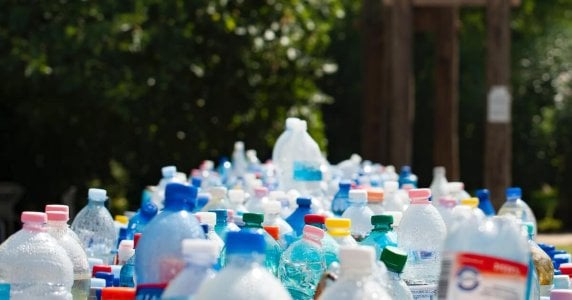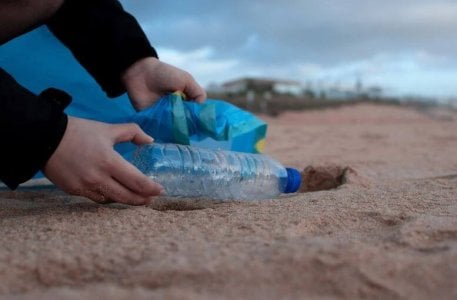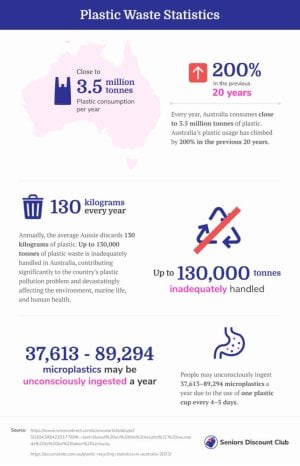New disease caused by plastic consumption found in seabirds - Are humans at risk?
- Replies 16
We all know plastic pollution is an issue, but now, because scientists have found a new, plastic-induced disease, there are now urgent calls for more research on the pollutant’s impact on human tissue.
According to a study, seabird stomachs have been found scarred by microplastics – and this could be bad news for human health.
A new Australian study has shed light on a concerning health risk: plastic-induced disease.
It’s a risk that, until recently, most of us wouldn’t even think of. But as plastic is increasingly in our environment, we need to be aware that it may also be sneaking into our food (and bodies).
The startling discovery was made by Adrift Lab’s research on Lord Howe Island, 700 km northeast of Sydney. The study found a new disease, 'plasticosis', in the stomach linings of 30 birds (flesh-footed shearwaters).
While the study focused on a specific bird, it also estimated that around 1,200 other marine species ingest plastic and could suffer similar symptoms.
Humans worldwide are inadvertently consuming increasing amounts of plastic due to the rising pollution levels in our food and drinking water, along with traces found in household dust. This is why the study’s results could also be important in understanding plastic’s impact on our own health.
According to the study, the birds had developed fibrosis – or the thickening and scarring of tissue – and this is now infiltrating the inner lining of their organs and destroying their glands.
In humans, fibrotic diseases are not uncommon. Asbestosis and silicosis are both fibrosis found in the lungs and are caused by breathing in asbestos and silica. The report’s findings suggested that this new inflammatory disease could have similarly devastating effects on humans.
This is a relatively new field of research, as there are not a lot of studies done to explore the effects of plastic ingestion.
Fragments have previously been found in their flesh, likely resulting in stunted growth and altered blood chemistry. Adrift Lab's new research examined how macro and microplastics resulted in fibrosis in the stomach.
A separate research paper published this year estimated that people ingest almost 90,000 microplastics annually from using a plastic cup once every four to five days. Even bottled water and beer have been reported as containing high numbers of microplastics.
‘It is crucial to better understand the impacts of plastic on biota so that we can also better understand how our own tissues may respond to this pollutant,’ the seabird study authors explained.
Hayley Charlton-Howard, one of the authors of the ‘plasticosis’ study, told reporters that with plastic pollution in the environment set to increase, human exposure to plastic is ‘basically inevitable’.
She added that the situation is ‘quite scary’.
Previous studies by the authors found plastic fragments inside vital organs responsible for filtration, such as the kidney, liver, and digestive organs. Other research detected plastics in human breast milk, blood, and placenta.
According to Ms Charlton-Howard, plasticosis is the scarring of the stomach tissue due to plastic ingestion. This means that the stomach cannot function because it loses flexibility.
‘In the stomach, the purpose is to be able to expand, move and contract in order to digest food. Any restriction on that movement can really affect how the stomach is able to function and also its ability to store food,’ she said.
Another concern is that plastic can impact digestive glands within birds, with the research suggesting that the glands were ‘damaged and changed in structure’. These glands release fluids that are responsible for processing food. But due to plasticosis, the birds’ ability to absorb nutrients could be compromised.
These glands are also responsible for hydrochloric acid and stomach mucus, which helps prevent infection. It is believed that birds could be more susceptible to diseases and parasites.
‘That’s really bad because plastics are known vectors for pathogens. As plastics move around the environment, they can collect parasites and bacteria and viruses on their surface. And when that's eaten, those pathogens can be transported into the stomach,’ Ms Charlton-Howard said.
While the impact of plasticosis on humans is unlikely to be as severe as it is in birds, the impact will still be felt. ‘It doesn't bode well for any other species that may also be found to ingest plastic,’ she explained.
Health experts have previously warned about the chemicals found in plastic which are said to have the ‘ability’ to alter an individual’s DNA. They also claimed that individuals who are exposed to plastics on a regular basis have a high chance of accumulating organ damage. You can read more details about this here.
‘Due to the potential impacts of plastic on the health of wildlife, and humans by extension, our results thus highlight the urgent need to continue to strengthen our knowledge of the sub-lethal impacts of this diverse pollutant,’ the study concluded.

Let us know your thoughts about this study in the comments below. Are you concerned?
According to a study, seabird stomachs have been found scarred by microplastics – and this could be bad news for human health.
A new Australian study has shed light on a concerning health risk: plastic-induced disease.
It’s a risk that, until recently, most of us wouldn’t even think of. But as plastic is increasingly in our environment, we need to be aware that it may also be sneaking into our food (and bodies).
The startling discovery was made by Adrift Lab’s research on Lord Howe Island, 700 km northeast of Sydney. The study found a new disease, 'plasticosis', in the stomach linings of 30 birds (flesh-footed shearwaters).
While the study focused on a specific bird, it also estimated that around 1,200 other marine species ingest plastic and could suffer similar symptoms.
Humans worldwide are inadvertently consuming increasing amounts of plastic due to the rising pollution levels in our food and drinking water, along with traces found in household dust. This is why the study’s results could also be important in understanding plastic’s impact on our own health.
According to the study, the birds had developed fibrosis – or the thickening and scarring of tissue – and this is now infiltrating the inner lining of their organs and destroying their glands.
In humans, fibrotic diseases are not uncommon. Asbestosis and silicosis are both fibrosis found in the lungs and are caused by breathing in asbestos and silica. The report’s findings suggested that this new inflammatory disease could have similarly devastating effects on humans.
This is a relatively new field of research, as there are not a lot of studies done to explore the effects of plastic ingestion.
Fragments have previously been found in their flesh, likely resulting in stunted growth and altered blood chemistry. Adrift Lab's new research examined how macro and microplastics resulted in fibrosis in the stomach.
A separate research paper published this year estimated that people ingest almost 90,000 microplastics annually from using a plastic cup once every four to five days. Even bottled water and beer have been reported as containing high numbers of microplastics.
‘It is crucial to better understand the impacts of plastic on biota so that we can also better understand how our own tissues may respond to this pollutant,’ the seabird study authors explained.
Hayley Charlton-Howard, one of the authors of the ‘plasticosis’ study, told reporters that with plastic pollution in the environment set to increase, human exposure to plastic is ‘basically inevitable’.
She added that the situation is ‘quite scary’.
Previous studies by the authors found plastic fragments inside vital organs responsible for filtration, such as the kidney, liver, and digestive organs. Other research detected plastics in human breast milk, blood, and placenta.
According to Ms Charlton-Howard, plasticosis is the scarring of the stomach tissue due to plastic ingestion. This means that the stomach cannot function because it loses flexibility.
‘In the stomach, the purpose is to be able to expand, move and contract in order to digest food. Any restriction on that movement can really affect how the stomach is able to function and also its ability to store food,’ she said.
Another concern is that plastic can impact digestive glands within birds, with the research suggesting that the glands were ‘damaged and changed in structure’. These glands release fluids that are responsible for processing food. But due to plasticosis, the birds’ ability to absorb nutrients could be compromised.
These glands are also responsible for hydrochloric acid and stomach mucus, which helps prevent infection. It is believed that birds could be more susceptible to diseases and parasites.
‘That’s really bad because plastics are known vectors for pathogens. As plastics move around the environment, they can collect parasites and bacteria and viruses on their surface. And when that's eaten, those pathogens can be transported into the stomach,’ Ms Charlton-Howard said.
While the impact of plasticosis on humans is unlikely to be as severe as it is in birds, the impact will still be felt. ‘It doesn't bode well for any other species that may also be found to ingest plastic,’ she explained.
Health experts have previously warned about the chemicals found in plastic which are said to have the ‘ability’ to alter an individual’s DNA. They also claimed that individuals who are exposed to plastics on a regular basis have a high chance of accumulating organ damage. You can read more details about this here.
‘Due to the potential impacts of plastic on the health of wildlife, and humans by extension, our results thus highlight the urgent need to continue to strengthen our knowledge of the sub-lethal impacts of this diverse pollutant,’ the study concluded.
Key Takeaways
- A new plastic-induced disease called 'plasticosis' has been found in seabirds and has raised concerns about the impact on human health.
- The study found large amounts of scar tissue inside the stomach lining of all 30 flesh-footed shearwaters, which could be related to increasing amounts of plastic consumed by humans through food, drinking water, and household dust.
- Research has shown that plastic ingestion can have various health impacts on wildlife, and these findings highlight the urgent need to better understand the effects of plastic pollution on human health.
- The study's author, Hayley Charlton-Howard, says that human exposure to plastic is 'basically inevitable', and the current situation is 'quite scary'.










